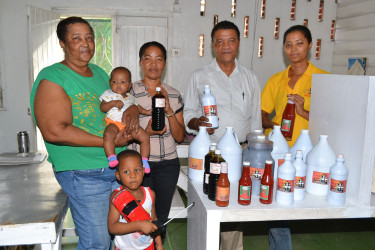Years of absence from the family business appears not have dimmed the enthusiasm of Clement Corlette for enterprise and for searching for avenues through which growth and expansion can be realized.
Supreme Enterprises is one of a handful of companies that had made an earlier breakthrough on the agro-processing market, before the contemporary emergence of much larger numbers of similar efforts. At its factory situated in the East Ruimveldt Market complex, the entity manufactures tomato ketchup, barbecue sauce, Chinese seasoned sauce, cassava cassareep, preserved carambola, black pepper and packaged spices.
Supreme Enterprises was started back in December 1988. The initial $50,000 investment in the venture was raised by Corlette through a loan from the Clerical & Commercial Workers Union (CCWU). Apart from the equipment necessary to commence the manufacturing operation, a modest venture then situated at Plasisance on the East Coast Demerara, he bought 25 pounds of pepper to manufacture product to catch a share of the Christmas market that year. He recalls personally packaging his first batch of product and delivering it to his first ever customer, a Mr Compton Narine.

Corlette says his pepper was “a sellout,” the extent of its success in the period ahead allowing, within eight months, for an investment in a vehicle, a Tapir. The sales generated from the marketing of Supreme Pepper Sauce also allowed for expansion into plantain, eddo and cassava flour. The former regional chairman recalls that in those days much of his time was spent travelling through villages on the West Coast and the East Coast Demerara, as far as Parika and Perth, Mahaicony, respectively, selling his products.
It was around that time that Corlette took his earliest steps to transform the enterprise into a genuine family business. Having by made then generated sufficient capital to secure hired help he made an offer to his eldest daughter, Rhonda, a public servant at the time: he would match her salary if she would join the firm. She accepted the offer and currently serves as the entity’s Marketing Manager.
Growth necessitated expansion and the company succeeded in acquiring a factory in the East Ruimveldt Market that had originally been established by the Women’s Revolutionary Socialist Movement (WRSM), the women’s arm of the People’s National Congress (PNC).
Over time, other products were added to the Supreme range and the company’s market expanded to include local supermarkets and the hospitality sector.
Like other ventures of its kind, however, Supreme Enterprises, has had to cope with the effects of a limited market and, over time, mounting competition from both local and foreign products. As market share diminished and the operations of the major local retail outlets like Guyana Stores and Fogarty’s declined, the company had to let go of some of its ten seasonal employees. When in 2007, Corlette accepted the appointment as Regional Chairman, Supreme Enterprises lost the full-time attention of its founder. It was then that his wife Kathleen and their four children threw their collective weight behind the scaled-down company.
Having spent much of his life in business, Corlette appears to have come full circle. He began in the Sales Department of JP Santos then was sent to the entity’s East Bank branch as its manager. Afterwards he served as Production Manager at a condiment factory on the East Coast Demerara. While there, he completed a correspondence course in the production of condiments with the Wyoming State University in the United States of America, writing the examination through the University of Guyana. It was upon the successful completion of the course and in consultation with his wife that the decision was made that they would start a business of their own.
Seemingly comfortable at the helm of Supreme Enterprises, Corlette appears to be contemplating ways in which to re-energize the company. Much has changed and his thoughts on the business environment stray, perhaps inevitably, to what is now the significantly heightened competition which locally manufactured products now face from the current invasion of foreign competition. He recognizes that restricting the importation of foreign products is no longer on the cards, so he is advocating what he describes as “better opportunities” for locally produced goods. One way of doing so, he says, is by seeking to persuade the major supermarkets to allow more shelf space for small local manufacturers. He concedes, however, that much has changed. Back in 1988, “We almost had a closed market. These days a wide array of imported goods is being sold.” He notes that most similar enterprises that began manufacturing and trading “during my time” have now closed.
Corlette believes that while locally produced agro-processed foods are probably as good as imported ones, local products are way behind the competition in the areas of labelling and packaging. He says it is a matter of small local manufacturers simply not having the capital to invest in product presentation. “We do not have the market that allows us to finance those pursuits,” Corlette says.
Overseas markets, too, are fraught with challenges. These are associated with, among other things, unreliable raw material supplies and price inconsistencies. Corlette recalls his first and only opportunity to secure an export market in the region in 2006. A Grenadian company had contacted him with a view to securing supplies of local plantain flour. He had subsequently sought to secure supplies of plantains at a stable price over a long period but had been unable to do so. The farmers with whom he spoke were insisting that he pay the market price whenever it applied. The Grenadian venture did not go beyond a single shipment of plantain flour. By contrast, he has, for the past ten years, shared an arrangement with a Pomeroon farmer who has allowed him to secure supplies of carambola at a stable price.
Corlette is now beginning to re-settle into the world of enterprise. He is under no illusions about the journey that he has ahead of him. He concedes that things have changed, that Supreme Enterprises is, these days, operating in a decidedly more competitive market and that marketing techniques have become more sophisticated in the years since he stepped aside to venture into public service.
He believes that it is the consistency of his product quality that has allowed him to hold on to an important share of the local market that now includes Nigel’s Supermarket, Ram’s Supermarket on Sheriff street as well as a share of the hospitality sector. From here, he says, he is prepared to work his way forward.
Expansion is a matter of conjecture. He has never engaged the banking sector. “I have never had the collateral to do so,” he says, his intonation leaving the impression that the age-old hurdle which small businesses must face when engaging the commercial banking system still persists. As far as the future is concerned, however, he appears to be keeping his options open.









